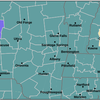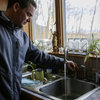COVID tests still in demand as new daily cases again top 1,000
ALBANY COUNTY — After the county announced last Thursday, Jan. 6, that free COVID-19 test kits would be handed out at rural Stewart’s Shops, the hand-out finally took place for an hour on Monday afternoon, Jan. 10.
After being allocated 10,000 free rapid antigen test kits on Dec. 23, Albany County was allotted another 10,000 this week. As before, the kits were largely distributed by the sheriff’s office to municipalities throughout the county based on population.
However, 1,000 of the kits were reserved for six Stewart’s shops to distribute “to ensure there is equity for those who do not have easily accessible COVID testing sites near them,” Albany County Executive Daniel McCoy said in a release.
Berne’s outgoing supervisor, Sean Lyons, had written a letter to the Enterprise editor on Dec. 31, “Berne is the definition of an underserved community,” saying he was insulted by the 89 tests Berne received the last time the county distributed tests. The 10,000 rapid-test kits for Albany County, which has over 320,000 residents, were distributed to municipalities based on population. With 89 kits and a population of about 2,700, Berne received a bit over the 1-kit-per-32-residents ratio.
Lyons, however, pointed out the lack of pharmacies and urgent-care centers in the Hilltowns as well as the lack of internet service through which residents might order kits.
The Enterprise asked McCoy’s spokeswoman, Mary Rozak, why the county, concerned with equity in rural areas, wouldn’t simply give the rural municipalities more tests rather than distributing through Stewart’s Shops. “Someone may not be as comfortable going to a municipal setting,” she said. “Or they may not hear about it at a municipal setting whereas, if you’re going to a local convenience store … you’ll hear about it and you’re comfortable.”
At 12:35 p.m. on Monday, Stewart’s sent out a press release announcing the test kits would be distributed from 2 to 3 p.m. outside these stores: 2475 Delaware Turnpike in New Scotland on the outskirts of Clarksville, 1001 Altamont Boulevard in Altamont, 788 Helderberg Trail in East Berne, 2457 Route 9W in Ravena, 1344 Route 9W in Selkirk, and 1360 Indian Fields Road in Feura Bush.
“Unfortunately, our rural communities lack testing sites, which is why I’m proud to partner with our friends at Stewart’s Shops to distribute these at-home tests that I secured from Governor Hochul, ensuring there is a greater level of equity in our fight against COVID,” said McCoy in the release. “These will bolster the thousands of test kits that we’ve already sent to our local cities, towns and villages and improve our ability to detect the virus and stop the spread.”
Gary Dake, president of Stewart’s shops was also quoted in the release, saying, “These tests will help us to keep our communities safe and healthy. This is just one of the many ways that Stewart’s Shops makes your life easier.”
Warren County in the Adirondacks, part of the designated Capital Region area, also distributed tests through Stewart’s. The Stewart’s Shop in Chestertown had its tests gone in minutes on Jan. 6 after a radio announcement was made.
Albany County didn’t want to list the number of tests going to each Stewart’s Shop, said Rozak. “There will be people seeking out these stores not from the Hilltowns,” she said. “If they think there are tons of these kits out there, it may drive people from Albany to go out there, people from Guilderland that would have access to other places.”
The Stewart’s workers distributing tests outside the Altamont store on Monday, Joe Fryer arnold Nick Vilardi, said they started with 180 kits — each kit has two tests — at 2 p.m. and the first 90 went in a rush; by the end of the allotted hour for hand-outs, some kits remained. No identification was required.
The town of Guilderland used an online system for residents to sign up for one test kit per household; they signed up for designated time slots to drive by, show identification, and pick up the tests. “Within hours of receiving the shipment, we shared the link by email and Nixle notice to residents, and placed posts on the Town’s Facebook and Twitter pages,” Supervisor Peter Barber reported in his daily COVID email to residents.
“Within an hour, all 720 boxes were reserved,” he wrote. “EMS is also distributing 90 boxes of at-home test kits to housebound and special needs residents and another 90 boxes were delivered to the Village of Altamont.”
Barber also wrote, “Nearly all other communities, like the City of Albany, are retaining a large number of the County’s delivered at-home tests for testing their municipal workers.”
But, he said, because Guilderland’s Emergency Medical Services got licensed early in the pandemic by the state’s health department to test and vaccinate, “EMS has routinely tested Town staff for COVID-19 which has helped the Town remain open and provide services to residents throughout the pandemic. This step has allowed the Town to distribute the entire shipment of at-home test kits to residents.”
The state has opened two free testing sites in Albany County:
— At Crossgates Mall in Guilderland, in the former Ruby Tuesday restaurant. Run by WellNorth, the site offers both rapid antigen and PCR tests. Appointments can be booked at https://www.gogettested.com/; and
— At the uptown University at Albany campus, in the Colonial Dining Hall at 1400 Washington Ave., run by Quadrant biosciences. The site administers an “oral, saliva based” PCR test, which can be booked here.
Polymerase chain reaction, or PCR, tests are sent to a lab to screen for the presence of viral RNA, which is detectable in the body before antibodies form or symptoms of the disease are present; PCR tests may also come back positive after symptoms have faded. Antigen tests, which show results in 15 minutes without a lab, are best at identifying COVID-19 when symptoms are present.
Newest numbers
On Monday morning, McCoy announced 1,115 new cases of COVID-19. This number is probably low because many people have been unable to secure tests or have not reported positive test results to the county.
Residents are asked to submit the positive results of at-home COVID tests on the county website, using the online submission link here, or by visiting the Albany County website here.
“This is the third consecutive day that I’ve had to report new daily COVID infections well above 1,000, a trend that is likely to continue,” said McCoy in the release. “Unfortunately, we’re seeing hospitalizations moving in the wrong direction as well, and we now have the most county residents currently in the hospital with the virus since February 4.”
The county’s seven-day average of new daily positive cases is now up to nearly 1,000 at 966.1.
Albany County’s most recent seven-day average of cases per 100,000 is up to 218.8 and the Capital Region’s average of cases per 100,000 is now up to 232.6.
There are now 7,193 active cases in Albany County, up from 6,644 on Sunday. The number of county residents under quarantine increased to 7,771 from 7,192.
There were 16 new hospitalizations since yesterday, and there are now 122 county residents currently hospitalized with the coronavirus — a net increase of six. Thirteen of those hospital patients are in intensive-care units, down from 14 on Sunday.
Albany County’s COVID-19 death toll remains at 476.
“Now is not the time to let our guards down,” said McCoy. “It’s critical that we continue to grow our vaccination and booster rates, because we know that these shots have contributed to fewer COVID deaths compared to last winter. Additionally, we need everyone to continue wearing masks in public, avoiding large gatherings to the extent possible, and staying home if they’re experiencing symptoms until we can get the spread of the virus under control.”
As of Sunday, 79.4 percent of all Albany County residents have received at least the first dose of the vaccine, and 72.1 percent have been fully vaccinated. The first-dose vaccination rate for county residents 18 and older is 88.2 percent.



